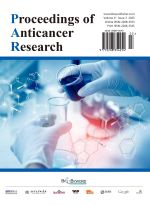Abstract
Objective: To explore and analyze the clinical effect of combination adjuvant chemotherapy with epirubicin and docetaxel for patients after radical mastectomy for breast cancer. Methods: This study enrolled 60 patients between May 2022 and December 2024, who were randomly allocated into two equal treatment groups (n = 30 each). The control group received standard chemotherapy, whereas the observation group was treated with a combined adjuvant regimen of epirubicin and docetaxel. Therapeutic outcomes were systematically compared between the groups. Results: The comparative analysis of chemotherapy regimens revealed significant intergroup differences in multiple outcome measures. The observation group demonstrated superior clinical efficacy (96.67% vs 80.00%, P < 0.05) alongside a more favorable safety profile (adverse reaction incidence: 3.33% vs 20.00%, P < 0.05). Metabolic assessments showed better glycemic control in the observation group, with both fasting and postprandial blood glucose levels being significantly lower than controls (P < 0.05), while maintaining comparable values to pretreatment baselines (P > 0.05). Furthermore, quality of life assessments indicated significantly better outcomes in the observation group compared to controls (P < 0.05). Conclusion: The combination of epirubicin and docetaxel as adjuvant chemotherapy for patients after radical mastectomy for breast cancer has significant clinical effects, can improve patients’ quality of life, and has high safety. It is worthy of adoption.
References
Zeng Q, Gu T, Zhang T, et al., 2022, Effects of Epirubicin Combined with Docetaxel Neoadjuvant Chemotherapy on Ki-67 and Matrix Metalloproteinase-9 levels in Breast Cancer Patients. Sichuan Journal of Anatomy, 30(1): 18–19.
Zhang H, 2022, Effects of Docetaxel Combined with Gemcitabine Neoadjuvant Chemotherapy on Patients Undergoing Radical Mastectomy. Tianjin Pharmaceutical Journal, 34(4): 55–58.
Wang Y, 2022, Efficacy and Safety of Doxorubicin Liposome Combined with Cyclophosphamide Sequential Docetaxel in Neoadjuvant Chemotherapy for Primary Breast Cancer. Chinese Journal of Modern Drug Application, 16(5): 126–129.
Li H, 2022, Comparison of the Efficacy and Safety of Paclitaxel Liposomes and Docetaxel in Neoadjuvant Chemotherapy for Breast Cancer. Chinese and Foreign Medical Research, 20(4): 115–118.
Yang M, Zhang P, Zhang X, et al., 2022, Observation on the Preventive Effect of Dexrazoxane on Epirubicin Cardiotoxicity in Breast Cancer Patients Treated with Epirubicin Chemotherapy. Shandong Medical Journal, 62(15): 38–43.
Wu X, Wang Z, Guo Y, et al., 2022, Effects of Different Neoadjuvant Chemotherapy Regimens on Ki-67 Expression and Immune Function in Patients with Locally Advanced Breast Cancer. Chinese Medical Innovation, 19(3): 73–76.
Zhen H, Pan L, Gao J, et al., 2022, Effects of Epirubicin Combined with Docetaxel Neoadjuvant Chemotherapy on Short- and Long-term Efficacy and Expression of Proliferating Cell Nuclear Antigen in Breast Cancer Patients. Chinese Journal of Experimental Surgery, 39(2): 344–347.
Wang X, 2021, Clinical Effect of Epirubicin Combined with Docetaxel Neoadjuvant Chemotherapy in the Treatment of Breast Cancer and its Influence on the Expression of Ki-67 in Cancer Tissue. Modern Doctors of China, 59(11): 92–95.
Chen Y, Wang X, Du F, et al., 2023, Association between Homologous Recombination Deficiency and Outcomes with Platinum and Platinum-free Chemotherapy in Patients with Triple-negative Breast Cancer. Cancer Biology & Medicine, 20(2): 155–168.
Huang X, Fan X, Cheng Q, et al., 2023, Intrinsic Wave Velocity Propagation: A Novel Parameter for Assessing the Effect of Anthracycline Chemotherapy Agents on Cardiac Diastolic Function in Breast Cancer Patients. Current Medical Science, 43(6): 1229–1237.
